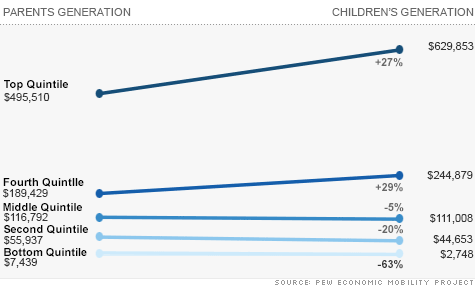Search News

Wealth inequality is on the rise.The top two tiers saw median family wealth increase while the lowest wealth rung lost 63% of family wealth over a generation.
NEW YORK (CNNMoney) -- Most Americans make more than their parents did, but that doesn't mean they're all moving up the economic ladder.
Some 84% of Americans have higher family incomes than their parents had at the same age, according to a new report from the Pew Economic Mobility Project. And 93% of those who grew up in the poorest fifth of the income ladder exceed their parents' family income as adults.
But out-earning their parents hasn't helped many of them climb out of poverty, as many poor American families remain stuck at the bottom of the income barrel. Some 43% remain in the lowest quintile.
"It calls into question the quality of the opportunity Americans believe exists in the United States," said Erin Currier, project manager of the Pew Economic Mobility Project.
When it comes to family wealth, the inequality story is similar. Of those raised at the bottom of the wealth ladder, 72% exceeded their parents' wealth as adults. But 41% remained stuck there.
Overall, half of Americans have more family wealth than their parents.
The project focused on real parents and children from the late 1960s into the late 2000s. The parents' income was measured a little more than 40 years ago and their wealth in 1984. Children's income and wealth was measured in the 2000s. Figures are adjusted for inflation, and income data is adjusted for family size.
Pew also looked at the overall wealth distribution of the parents and their children. Over the generation, only the top two tiers saw median family wealth increase, by 27% for the wealthiest and 29% for the next level down.
The middle wealth tier, meanwhile, lost 5%.
Those at the lowest wealth rung lost a whopping 63%, dropping from a median family wealth of $7,439 in the parents' generation to $2,748 in the children's.
Others being left behind include blacks and the less educated.
The share of black families at the top two rungs of the family income and wealth ladders is so small that some mobility data cannot be calculated. So Pew focused only on the bottom three tiers.
The project found that blacks have a harder time exceeding their parents' family income and wealth than whites. And more than half of blacks raised in the bottom quintiles remain stuck there, while only one-third of whites do.
They are also more likely to be downwardly mobile. Some 56% of blacks raised in the middle fall to the bottom of second rung as adults, compared with 32% of whites. And in terms of wealth, more than two-thirds slip out of the middle, while only 32% of whites do.
Getting a college degree is also a ticket to economic mobility. For those raised at the bottom of the income ladder, nearly one half of children were stuck there as adults if they didn't go to college. But only 10% of those with a college degree remained at the bottom.
One main reason that children have more family wealth than their parents is because of the increasing number of married women in the workforce. Though men's earnings gains have been slowing, women have been making up the difference.
"Mobility is more and more a family enterprise," Currier said. "Families are moving up the income and wealth ladders because of second earners." ![]()
| Overnight Avg Rate | Latest | Change | Last Week |
|---|---|---|---|
| 30 yr fixed | 3.80% | 3.88% | |
| 15 yr fixed | 3.20% | 3.23% | |
| 5/1 ARM | 3.84% | 3.88% | |
| 30 yr refi | 3.82% | 3.93% | |
| 15 yr refi | 3.20% | 3.23% |
Today's featured rates:
| Latest Report | Next Update |
|---|---|
| Home prices | Aug 28 |
| Consumer confidence | Aug 28 |
| GDP | Aug 29 |
| Manufacturing (ISM) | Sept 4 |
| Jobs | Sept 7 |
| Inflation (CPI) | Sept 14 |
| Retail sales | Sept 14 |